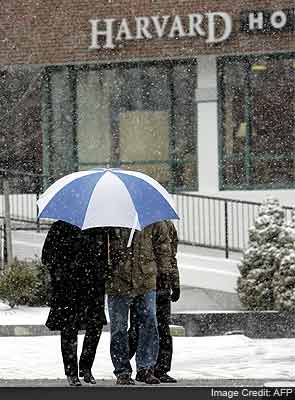Harvard has forced dozens of students to leave in its largest cheating scandal in memory, the university made clear in summing up the affair Friday, but it would not address assertions that the blame rested partly with a professor and his teaching assistants.
Harvard would not say how many students had been disciplined for cheating on a take-home final exam given in May in a government class, but the university’s statements indicated that the number forced out was around 70. The class had 279 students, and Harvard administrators said last summer that “nearly half” were suspected of cheating and would have their cases reviewed by the university’s Administrative Board. On Friday, a Harvard dean, Michael D. Smith, wrote in a letter to faculty members and students that, of those cases, “somewhat more than half” had resulted in a student’s being required to withdraw.
Smith, the dean of the Faculty of Arts and Sciences, wrote, “Of the remaining cases, roughly half the students received disciplinary probation, while the balance ended in no disciplinary action.” He wrote that the last of the cases was concluded in December; no explanation was offered for the delay in making a statement. The forced withdrawals were retroactive to the start of the school year, he wrote, and those students’ tuition payments would be refunded.
The Administrative Board’s website says that forced withdrawals usually last two to four semesters, after which a student may return.
Howard Gardner, a professor at Harvard’s Graduate School of Education who has spent much of his career studying cheating, said that, eventually, the university should “give a much more complete account of exactly what happened and why it happened.”
The episode has given a black eye to one of the world’s great educational institutions, where, in an average year, 17 students are forced out for academic dishonesty. It was a heavy blow to sports programs, because the class drew a large number of varsity athletes, many of them on the basketball team. Two players accused of cheating withdrew in September rather than risk losing a year of athletic eligibility on a season that disciplinary action could cut short.
People briefed on the investigations say that they went on longer than expected because the university’s effort was painstaking, hiring additional staff members to comb through each student’s exam and even color-coding specific words that appeared in multiple papers.
One implicated student, who argued that similarities between his paper and others could be traced to shared lecture notes, said the Administrative Board demanded that he produce the notes six months later. The student, who asked not to be identified because he still must deal with Harvard administrators, said he found some notes and was not forced to withdraw.
Some Harvard professors and alumni, along with many students, have protested that the university was too slow in resolving the cases, too vague about its ethical standards or too tough on the accused.
Robert Peabody, a lawyer representing two implicated students, said as their cases dragged on, with frequent postponement, “they emotionally deteriorated over the course of the semester.” He said one was forced to leave the university, and the other was placed on academic probation.
While Harvard has not identified the course or the professor involved, they were identified by the implicated students as Introduction to Congress and Matthew B. Platt, an assistant professor of government. Platt did not respond to messages seeking comment Friday.
In previous years, students called it an easy class with optional attendance and frequent collaboration. But students who took it last spring said that it had suddenly become quite difficult, with tests that were hard to comprehend, so they sought help from the graduate students who ran the class discussion groups and graded assignments. Those teaching fellows, they said, readily advised them on interpreting exam questions.
Administrators said that on final-exam questions, some students supplied identical answers, down to, in some cases, typographical errors, indicating that they had written them together or plagiarized them. But some students claimed that the similarities in their answers were due to sharing notes or sitting in on sessions with the same teaching fellows. The instructions on the take-home exam explicitly prohibited collaboration, but many students said they did not think that included talking with teaching fellows.
Smith’s long note did not say how the Administrative Board viewed such distinctions, or whether the university had investigated the conduct of the professor and teaching fellows, and a spokesman said Harvard would not elaborate on those questions.




